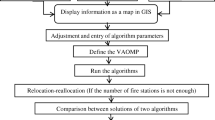Abstract
Associations of Volunteer Firefighters form the basis of helping the Portuguese population. In these institutions, to guarantee the first line of assistance, there are volunteers and also a group of professional firefighters. However, there are not always enough funds to hire the human resources effectively needed, or even to guarantee the continuity of services provided 24 h a day. In this work, the linear programming method was used to study a schedule problem, and the simulations presented were carried out at Excel OpenSolver. The aim was to understand the minimum number of firefighters needed to meet the demands of the population and to guarantee a quick response to requests that may occur over the day. Even with some restrictions associated with the specific roles of each firefighter, it was possible to design several scenarios, involving different shifts, and left the decision of the best solution for the responsible of the fire station taking into account the trade-off between costs and provided service.
Supported by Portuguese Foundation for Science and Technology (FCT - Fundação para a Ciência e a Tecnologia).
Access this chapter
Tax calculation will be finalised at checkout
Purchases are for personal use only
Similar content being viewed by others
References
Costa, F. J.: A saúde no trabalho: a realidade de quem socorre. Masther Thesis. Instituto Politécnico de Viana do Castelo (2015)
Moura, D., Oliveira, E.: Fighting fire with agents: an agent coordination model for simulated firefighting. In: Proceedings of the 2007 Spring Simulation Multiconference, vol. 2, pp. 71–78. Society for Computer Simulation International (2007)
Amaro, A.D.: O socorro em Portugal : organização, formação e cultura de segurança nos corpos de bombeiros, no quadro da Protecção Civil. PhD Thesis, universidade do Porto (2009)
United Nations Office for Disaster Risk Reduction. Sendai Framework for Disaster Risk Reduction 2015–2030 (2015)
United Nations.: Transforming our world: the 2030 Agenda for sustainable development (2016)
Devine, M., Bond, RR., Simms, V., Boyce, K. E., Kerr, DP.: Mapping the health, safety and wellbeing challenges of firefighting to wearable devices. In: Paper presented at British HCI Conference 2018, Belfast, Northern Ireland, pp. 1–5 (2018)
Raffer, C., Scheller, H., Peters, O.: The UN sustainable development goals as innovation drivers for local sustainability governance? examples from Germany. J. Public Sector Econ. 46(4), 459–487 (2022)
Thangavel, K., Spiller, D., Sabatini, R., Marzocca, P., Esposito, M.: Near real-time wildfire management using distributed satellite system. IEEE Geosci. Remote Sens. Lett. 20, 1–5 (2023)
Pordata. https://www.pordata.pt/portugal/numero+de+bombeiros-1188. Accessed 5 May 2023
Costa, G.: Shift work and occupational medicine: an overview. Occup. Med. 53(2), 83–88 (2003)
Chiang, S.L., et al.: Impact of rotating shifts on lifestyle patterns and perceived stress among nurses: a cross-sectional study. Int. J. Environ. Res. Public Health 19(9), 5235 (2022)
Zverev, Y.P., Misiri, H.E.: Perceived effects of rotating shift work on nurses’ sleep quality and duration. Malawi Med. J. 21(1), 19–21 (2009)
Moz, M., Pato, M.V.: An integer multicommodity flow model applied to the rerostering of nurse schedules. Ann. Oper. Res. 119, 285–301 (2003)
Costa, D.: Trabalho por turnos e descanso semanal - A atualidade de uma antiga controvérsia. Masther Thesis. Universidade Católica Portuguesa (2020)
Domingos, C.S.: Impacto do trabalho por turnos na saúde dos trabalhadores Caso dos Polícias de Segurança Pública (PSP). Masther thesis. Universidade do Porto (2017)
Francisco, A. S. (2017). O impacto do ambiente físico na eficácia do trabalho em equipa. Masther thesis. ISCTE (2017)
Schmutz, J.B., Meier, L.L., Manser, T.: How effective is teamwork really? the relationship between teamwork and performance in healthcare teams: a systematic review and meta-analysis. BMJ Open 9(9), e028280 (2019)
Bação, A.S.: Desenvolvimento do trabalho em equipa num contexto de cultura de safety: Estudo de caso numa empresa da indústria mineira. Masther thesis. Universidade de Évora (2023)
Scalabrin, I., Mores, C.J., Enderli Bodanese, R., Oliveira, J. A.: Programação linar: estudo de caso com utilização do solver da Microsoft Excel. Em Revista Universo Contábil (pp. 56–66). Blumenau, Brasil: Universidade Regional de Blumenau (2006)
Teles, R.E.: Desenvolvimento de uma ferramenta de apoio à alocação de recursos humanos Aplicação ao centro de distribuição da FNAC Portugal. Masther Thesis. ISCTE (2018)
Kowalik, P., Rzemieniak, M.: Binary linear programming as a tool of cost optimization for a water supply operator. Sustainability 13, 3470 (2021)
Mason, J.: OpenSolver – an open source add-in to solve linear and integer progammes in excel. In: Operations Research Proceedings, pp 401–406 (2012)
Acknowledgements
This work has been supported by FCT - Fundação para a Ciência e Tecnologia within the R &D Units Project Scope: UIDB/00319/2020. It is also supported by The Center for Research and Development in Mathematics and Applications (CIDMA) through the Portuguese Foundation for Science and Technology (FCT - Fundação para a Ciência e a Tecnologia), references UIDB/04106/2020 and UIDP/04106/2020. This research is part of Ana Rita Silva logistics master thesis.
Author information
Authors and Affiliations
Corresponding author
Editor information
Editors and Affiliations
Rights and permissions
Copyright information
© 2024 The Author(s), under exclusive license to Springer Nature Switzerland AG
About this paper
Cite this paper
Silva, A.R., Rodrigues, H.S., Silva, Â. (2024). Schedule Modeling in a Fire Station: A Linear Approach to Optimize Service and Human Resources. In: Pereira, A.I., Mendes, A., Fernandes, F.P., Pacheco, M.F., Coelho, J.P., Lima, J. (eds) Optimization, Learning Algorithms and Applications. OL2A 2023. Communications in Computer and Information Science, vol 1981. Springer, Cham. https://doi.org/10.1007/978-3-031-53025-8_32
Download citation
DOI: https://doi.org/10.1007/978-3-031-53025-8_32
Published:
Publisher Name: Springer, Cham
Print ISBN: 978-3-031-53024-1
Online ISBN: 978-3-031-53025-8
eBook Packages: Computer ScienceComputer Science (R0)




